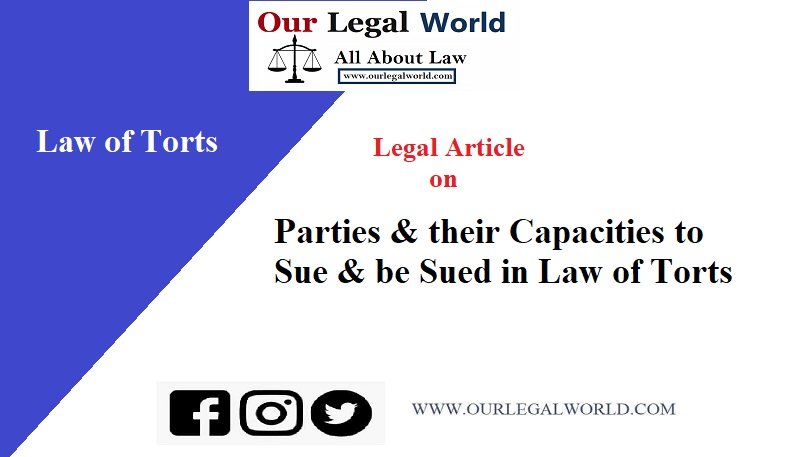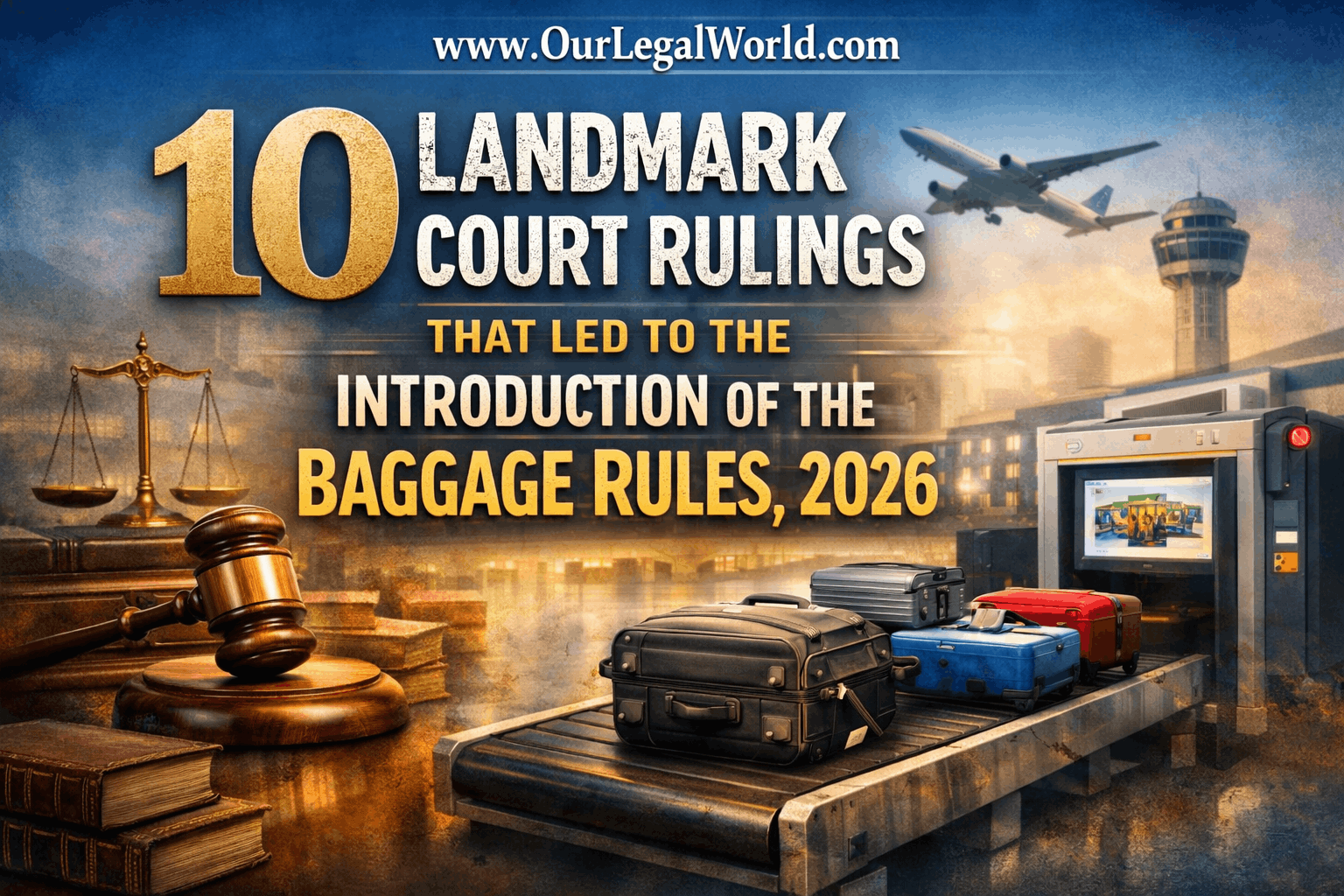Parties & their Capacities to Sue & be Sued in Law of Torts
Introduction
The people who are legitimately included or intrigued by any demonstration, undertaking, agreement, exchange, or lawful continuing; restricting defendants.
People who go into an agreement or different exchanges are viewed as gatherings to the understanding. At the point when a question brings about prosecution, the defendants are called gatherings to the claim. U.S. law has created rules that administer the rights and obligations of gatherings. Moreover, standards, for example, the standing teaching decide if an individual is a legitimate gathering to a claim. Likewise, extra gatherings might be added to lawful procedures once case has started.
Gatherings as Adversaries
The U.S. legitimate framework depends on the ill-disposed procedure, which expects gatherings to a lawful continuing to battle against one another. From this challenge of contending interests, the issues are introduced to the court and completely contended. At long last, one of the gatherings will get a good outcome.
For the enemy procedure to satisfy its crucial creating equity, it is imperative that the issues in question be contended by people who have a certified enthusiasm for them. Under the old guidelines of Common-Law Pleading, which used to manage who could bring a claim, just an individual who really held title to contested property could be a gathering in a claim concerning the property. This detail once in a while forestalled an individual who had the most to pick up or lose on the issue from turning into a gathering and introducing their case. This standard has now been supplanted by laws requiring each activity to be indicted by the genuine party in intrigue. This is most significant when one individual is dealing with an advantage to help another. For instance, directors of an expired individual’s domain can sue to ensure the bequest’s advantages without joining the recipients of the home as gatherings. This advanced standard hones the issues with the goal that the choice for a situation settles a discussion for all the gatherings in question.
The U.S. Incomparable Court has built up the standing convention to decide if the defendants in a government common continuing are the proper gatherings to bring the legitimate inquiries up for the situation. The Court has built up an intricate group of standards characterizing the nature and forms of standing. When all is said in done, to have standing a gathering must have an individual stake in the result of the case. An offended party more likely than not endured some immediate and generous injury or probably endure such a physical issue if a specific wrong isn’t changed. A litigant must be the gathering answerable for executing the supposed lawful wrong. An individual has remaining to challenge a law or strategy on sacred grounds on the off chance that he can show that the requirement of the law or execution of the approach encroaches on an individual protected right. Then again, much of the time a citizen doesn’t have remaining to challenge strategies or projects he is compelled to monetarily bolster.
Legitimate Entities that Can Be Parties
Just a real lawful element may start a claim. A characteristic individual is a lawful element, for instance, and any number of individuals can be parties on either side of a claim. An enterprise is blessed by its sanction with presence as a different legitimate substance. A business association is typically not thought about a lawful substance, however for the most part it can sue or be sued in the organization name or in the names of the individual accomplices.
Numerous states grant claims under a typical name. This game plan permits a business to be sued in the generally utilized business name on the off chance that it is clear who the proprietor or proprietors are. A claim against Family Dry Cleaners, for instance, may qualifies the offended party for gather a judgment out of the estimation of the business property. The offended party won’t have the option to contact property that has a place with the proprietor or proprietors actually, in any case, except if they have likewise been named litigants in the activity.
At the point when a gathering of people wishes to begin a claim, the gathering has a few alternatives. On the off chance that, for instance, a gathering of private land owners needs to challenge the development of a poisonous waste removal site in its locale, it can record a claim posting every land owner as an offended party. The gathering could likewise choose an affiliation name that the court acknowledges (Citizens Against Toxic Waste) to speak to those people. A progressively costly option is consolidate the gathering and document the suit under the partnership’s name.
The Class Action gives another alternative to bringing parties into an enormous scope common claim. In a legal claim, thousands and even a huge number of people can be parties. To acquire a class activity assignment, the offended parties must persuade the court that numerous people have comparative interests in the topic of the claim and that the offended parties can follow up for the gathering’s benefit without explicitly recognizing each individual from the gathering as involved with the prosecution. The legal claim can be a prudent technique for settling common cases that include enormous quantities of people with regular interests, particularly when the measure of every individual case is too little to even think about warranting free lawful activities by the inquirers.
Joinder of Additional Parties
Normally an offended party chooses when, where, and whom she or he needs to sue. Now and again an offended party may wish to join, or include, different gatherings after the beginning of the claim. Legitimate gatherings and fundamental or basic gatherings might be included while the activity is pending.
An appropriate gathering is any individual who might be a gathering in the claim. The Joinder, or expansion, of an appropriate gathering in a pending claim is completely allowable. The court may permit the joinder of an extra gathering, yet the claim doesn’t need to be excused in the event that it doesn’t. In certain states any individual who has an enthusiasm for the subject of the debate is an appropriate gathering in the claim. A few courts support joinder of each and every individual who could be influenced by the choice.
Conclusion
Under present day rules of method in numerous states and the government courts, joinder isn’t urged to where a claim gets clumsy or jumbled with random gatherings and cases. For the most part, joinder is affirmed where the cases of the people looked to be joined emerged out of a similar exchange or occasion as the cases of the current gatherings, with the goal that all the cases might be settled by responding to similar QUESTIONS OF LAW or reality. The choice to join extra gatherings is inside the circumspection of the court. Courts are mindful so as not to avoid parties with an enthusiasm for a claim on the grounds that an inability to join those gatherings may prompt a progression of claims with conflicting decisions. That could at last leave a meriting offended party without a cure or power a respondent to pay a specific case more than once.
Regardless of whether an individual is conceivably important or irreplaceable to an activity relies upon the character and degree of that individual’s enthusiasm for the subject of the claim. It is reasonable and fair to require any individual who has an intrigue that can be influenced by the claim to be joined as a gathering. An individual whose intrigue might be influenced by the result of the case is viewed as important, and such an individual ought to be joined if conceivable. An individual whose intrigue makes certain to be influenced by the result of the claim is viewed as a fundamental gathering, and the case can’t continue without this individuals.
References
- https://legaldictionary.thefreedictionary.com/The+Capacity+to+Sue+or+Be+Sued.
- https://www.legalbites.in/parties-capacities-sue-sued-tort-law/.
- https://law.jrank.org/pages/9048/Parties-Capacity-Sue-or-Be-Sued.html.
- https://thelawstudy.blogspot.com/2015/01/who-cannot-sue-and-cannot-be-sued.html?m=1.
Also Read:







